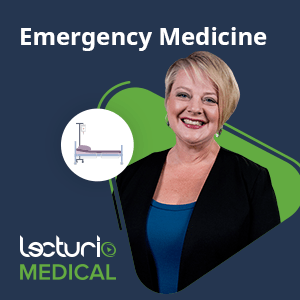Choosing a Medical Specialty
When entering the medical profession, one of the most important decisions you will make is choosing your medical specialty. Selecting your medical specialty will impact your life in many ways. Your personal life, career prospects, and the potential impact you will make on the healthcare field are all shaped by this decision. Selecting a specialty that will provide you with a great lifestyle will contribute to your happiness and to how you care for your patients for years to come.
What Makes a Great Lifestyle?
A great lifestyle can mean many different things for different people. What makes one person happy and fulfilled at work might be something that makes someone else feel drained and exhausted.
The rush of the Emergency Room might be overstimulating for some, while another might thrive in this fast paced environment. Going to work everyday with a predictable schedule and very specific skill set might make one person feel confident and accomplished, while another would find this redundant and mundane. During your clinical rotations, it is essential to take note of how you feel during each rotation to assess if that specialty is an environment you see yourself thriving and happy in. Figuring out what it is that makes you happy is the key to selecting a medical specialty with the best lifestyle for you.
Weighing the factors that contribute to making a medical specialty deemed as having the best lifestyle is a unique challenge. One person’s definition of a great lifestyle may differ from your definition. It’s important to assess the factors that contribute to providing a lifestyle that you want, and then determine what field can deliver those factors for you.
Some of the most significant factors to consider when selecting a specialty include schedule flexibility, compensation, field versatility, work-life balance, and personality. Are you an extrovert who enjoys discussing healthcare plans with your patients? Then maybe Radiology wouldn’t be the right field for you, where a majority of your work is behind the scenes. Do you value patient continuity and seeing a project through from start to finish? Then maybe Emergency Medicine isn’t the best pick, where you see many different patients but typically only once. Do you like working with your hands and performing procedures? Maybe Surgery would be a perfect fit. These are a few of the many questions you need to ask yourself before deciding on the medical specialty that is right for you.
The Top 5 Medical Specialties
Below, we explore the medical specialties with the best lifestyles based on some of the common factors that often contribute to a physician’s happiness. We’ll also further discuss what makes each specialty unique and the right fit for certain people.
Dermatology
Dermatology is one of the best medical specialties. It is a field that will challenge you intellectually yet allow you to enjoy doing procedures daily. The incredible schedule, work-life balance, continuity of patient care, and high compensation all contribute to this specialty coming in at the top of the list.
The typical schedule for Dermatology is Monday to Friday, 9:00 am – 5:00 pm, with very few emergencies. In most practices, there is no need to be on-call, work weekends, or overnight shifts. This creates a wonderful work-life balance and a desirable schedule. This lifestyle is likely a significant factor in the Medscape report of Dermatologists being the second to last burnt-out medical specialty, with only 33% of Dermatologists experiencing burnout. Their schedule boasts many benefits, such as the ability to spend weekends off with friends and family and a consistent sleep schedule that does not affect your circadian rhythm.
Dermatology is a versatile field. If you love working with your hands and having continuity of care with your patients, this might be the perfect field for you. Dermatologists see a breadth of clinical scenarios in their practices, from skin cancer removal to treating severe burns. Most Dermatologists work in outpatient settings, which means their practice is based in the community. Additionally, Dermatology offers the ability to perform many procedures without the schedule demands of a typical surgical training program and career. If you are passionate about surgical procedures, there is even the opportunity to pursue a fellowship in Mohs Micrographic Surgery which will train you to become an expert in diagnosing and treating skin cancer.
The compensation in relation to the schedule makes Dermatology one of the top earners in the medical field. According to the 2022 Medscape Physician Compensation Report, Dermatologists averaged $438,000 annually. Although other specialties such as Orthopedics and Plastic Surgery rank higher, these specialties often require much greater than a 40-50 hour work week, longer residency training, and more demanding schedules.
Radiology
Radiology is regarded as one of the top medical specialties due to its extremely versatile spectrum of practice, high compensation, flexible schedule, and excellent work-life balance. It is ideally suited for self-starters and motivated learners.
Radiology can be adapted to fit any area of interest and nearly any desired lifestyle. Are you interested in neurology, the musculoskeletal system, pediatrics, or women’s health? Then radiology has a subspecialty tailored to fit your interests. Do you enjoy performing procedures or emergency care? Radiology has that covered as well. Would you prefer to be a generalist and diagnose a wide spectrum of diseases? Radiology has a pathway to make this dream a reality.
A career in Radiology can be tailored to fit any lifestyle due to the many fellowship opportunities and broad spectrum of practice. This is a unique aspect of Radiology that isn’t seen in many other medical specialties. If you want to perform procedures, pursue interventional radiology or breast imaging. If you would rather work from home, no problem: you can easily tailor a career centered around remote work. A great deal of Radiology is characterized by individual work, but there are plenty of opportunities for patient interaction if this is something you desire.
The flexibility of the schedule and work-life balance also make Radiology a top choice. Most private practices are scheduled for a Monday-Friday 9–5 pm position. Some practices may require weekend coverage. If you choose to work in the more surgical subspecialties of Radiology, your hours may vary and be more demanding. There are also opportunities for shift work depending on your hospital system.
According to the 2022 Medscape Physician Compensation Report, Radiology ranks below Dermatology with an average salary of $437,000 annually. This high compensation, combined with the versatility in practice, flexible schedule, and diversity within the field, make this a top medical specialty to choose for many residency applicants.
Pathology
Pathology is a field that many medical students don’t even consider in their search for a medical specialty. Most medical schools don’t require a rotation in Pathology, so students breeze by this option. But similarly to Radiology, Pathology offers a flexible lifestyle, high compensation, and broad scope of practice.
Pathologists can work in a hospital-based setting, in the community, or in independent laboratories. The schedule varies depending on the practice setting. Some hospital-based settings follow a 40-hour work week, 9:00 am – 5:00 pm, while some Pathologists have reported working closer to 60-70 hours per week. The extensive range of working environments makes finding a practice that fits your lifestyle desires easy.
Pathology gets a bad reputation for not having a lot of direct patient care, although this is only sometimes the case.
If minimal patient interaction suits you, a field such as Forensic Pathology might be perfect. However, if you are interested in direct patient care, many avenues within Pathology involve patient care and procedures. There are 10 Pathology fellowships to choose from, each with its own unique lifestyle and scope of practice. In transfusion medicine, you interact with and treat patients during apheresis procedures. In hematopathology, pathologists often perform bone marrow biopsies. The versatility of the field allows for as much or as little patient interaction as you desire. This major benefit allows you to tailor your career to your preferences.
Regarding compensation, Pathologists fall in the middle range of reported salaries. The average income for a Pathologist is $334,000 per year. This high income, combined with the flexibility of the schedule, makes for an excellent lifestyle.
According to the 2022 Medscape Lifestyle, Happiness, and Burnout Report only 35% of Pathologists report burnout. This makes Pathology one of the bottom three fields in this category. Clearly, this field’s lifestyle, versatility, and compensation result in very happy Pathologists.
Take the Online Course: Pathology
Understand the big picture by looking at the small things with Dr. Richard Mitchell from Harvard Medical School!
Emergency Medicine
Emergency medicine is a unique field. It is a challenging, high-intensity specialty where you directly impact patients’ lives and often see the impact your medical decisions make on your patient immediately. Due to its flexible schedule, high compensation, and versatile scope of practice, Emergency Medicine is a top medical specialty. 82% of Emergency Physicians rated themselves as “very happy” or “happy” according to the Medscape Physicians Lifestyle Report 2022.
Do you love working in a team? Do you feel accomplished when you resuscitate a coding patient? Are you comfortable stabilizing patients but often never finding out what happens to them down the road? If so, Emergency Medicine might be a perfect fit.
Emergency Medicine has a very flexible schedule, which is almost entirely shift work. Shift work can be great for many reasons: there is no call schedule, so you are no longer responsible for your patients when you leave the hospital.
Often, you will work fewer shifts per month than if you worked a typical Monday- Friday schedule. Most Emergency physicians work 15 shifts per month, some more and some less. This makes for an outstanding work-life balance and provides plenty of opportunities to enjoy other aspects of life, such as traveling, family time, or exercise.
The only downside to shift work is that it often includes overnight shifts, which may be a big negative for certain people. Overnights impact your sleep cycle, and those extra days off may be spent sleeping to switch from days to nights and vice versa. Everyone’s body is different, and the way having an alternate sleep schedule may impact your health and happiness varies from person to person.
For those negatively impacted, this may contribute to burnout among Emergency Physicians. According to the Medscape Lifestyle, Happiness & Burnout Report 2022, Emergency Physicians are the number one specialty suffering from burnout. However, some people aren’t impacted by this switching schedule and love the extra time off. This is something you would have to assess for yourself before making Emergency Medicine your final decision.
Concerning compensation, according to the 2022 Medscape Physician Compensation Report, Emergency Physicians come in at the middle of the earners, making an average of $373,000 annually. For only working 15 shifts a month, this is a stellar amount of compensation for your time and energy while in the emergency department.
Take the Online Course: Emergency Medicine
Learn how to stabilize critical patients and manage emergency conditions with Dr. Julianna Jung and Dr. Sharon Bord from Johns Hopkins University!
Psychiatry
Psychiatry is a truly unique field. Forget your stethoscope because you will be delving into the mind and assessing its intricacies for the remainder of your career. If this interests you, Psychiatry offers a breadth of benefits, including flexible scheduling, flexibility in the scope of medical practice, and good compensation.
From addiction medicine to pediatric psychiatry, there are genuinely limitless opportunities available in this field. There are plentiful fellowship opportunities to tailor your Psychiatry practice to a niche field that you love. Additionally, there are various scheduling formats, so how your life looks after residency training is totally up to you. Do you enjoy inpatient psychiatric medicine? Then you can be employed by a hospital full-time. Prefer a more predictable schedule working Monday-Friday? Then you can start your own private practice. There are many opportunities to design your career in Psychiatry to make you happy, and you will have the ability to change this as you further your career. You may enjoy hospital medicine but want to switch to a private practice later in life or even do both! Psychiatry provides flexibility and the opportunity to decide what is best for you and when.
Tailoring your lifestyle to your specific needs within the field of Psychiatry is a huge asset to the field and contributes to the longevity of your career. Only 38% of Psychiatrists admitted to feeling burned out, placing them in the lower range for burnout nationwide.
All of the benefits of the field do come with one negative, which is a slightly lower compensation compared to some of the other top specialties on this list. According to the Medscape Physician Compensation Report, Psychiatrists averaged $287,000 annually, which falls in the mid to low range of salaries nationwide.
Take the Online Course: Psychiatry
Become a master of psychiatry with Dr. Helen Farrell from Harvard Medical School!
How to Make a Final Decision
Although these top 5 medical specialties have many advantages, there are still many specialties that might better fit your specific career goals. Other fields might require more work hours, less free time, and longer training, but if it is a field you are in love with, then go for it! What makes the best lifestyle is choosing the field you are passionate about. If you do this, then you will never work a day in your life.







